Ferdinand von Alten (1885-1933), born Baron von Lamezan auf Altenhofen, was a German stage and screen actor. He had a prolific career in the Weimar cinema and worked with both Ernst Lubitsch and Alfred Hitchcock. Ferdinand von Alten acted in a little over 100 films.
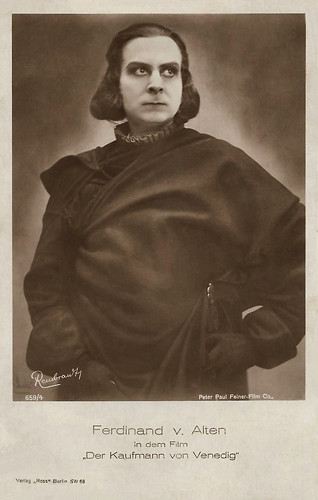
German postcard by Ross Verlag, Berlin, no. 659/4. Photo: Rembrandt / Peter Paul Felner-Film Co. Ferdinand von Alten as the Prince of Aragon in Der Kaufmann von Venedig/The Merchant of Venice (Peter Paul Felner, 1923).

German postcard by Ross Verlag, no. 700/8. Photo: Ufa. Publicity still for Kampf um die Scholle/Struggle for the Soil (Erich Waschneck, 1925) with Ferdinand von Alten and Margarete Schön.
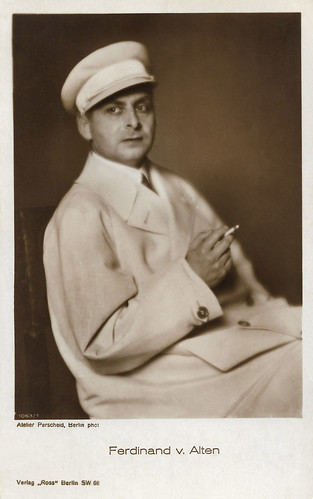
German postcard by Ross Verlag, no. 1063/7, 1927-1928. Photo: Atelier Perscheid, Berlin.
Ferdinand von Alten was born Theo von Alten, Baron von Lamezan auf Altenhofen in 1885 in St. Petersburg, then Russian Empire.
He began a military career like his ancestors had done, and became an officer. Yet, then he took acting lessons from reputed stage actor Albert Steinrück and decided to become an actor.
In 1911 he made his debut at the Hoftheater in Munich, where he worked until the end of the First World War. From 1918 he performed on the Berlin stages, particularly at the Deutsches Theater, where he was part of the ensemble during the 1920s.
He soon debuted in silent film and had his earliest known film part in the Henny Porten vehicle Die blaue Laterne (Rudolf Biebrach, 1918).
In the following years, he was often cast in medium and small roles, embodying elegant lovers, officers, and superiors.
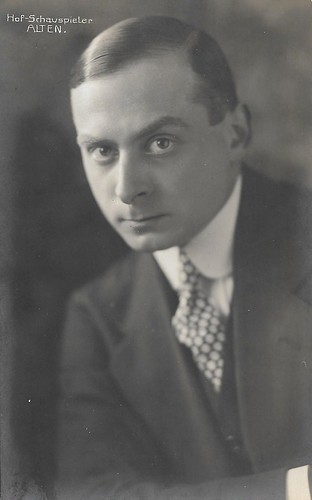
German postcard. Editor unknown. Ferdinand von Alten, Hof-Schauspieler. This card dates from before 1919 when Von Alten worked as a stage actor at the Munich Hof-Theater (1911-1918).
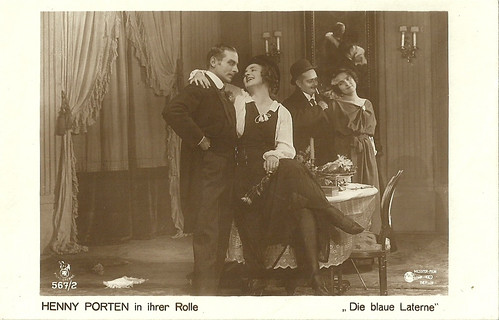
German postcard by Rotophot in the Film-Sterne series, no. 567/2. Photo: Messter-Film, Berlin. Henny Porten and Ferdinand von Alten in Die blaue Laterne (Rudolf Biebrach, Messter 1918), based on the novel by Paul Lindau.

German postcard by Ross Verlag, no. 695/4. Photo: Maxim Film. Henny Porten, Ferdinand von Alten, and Friedrich Kayssler in Gräfin Donelli (G.W. Pabst, 1924). Von Alten played Baron von Trachwitz.
From the late 1910s, Ferdinand von Alten alternated film companies. He acted at Berliner-Filmmanufaktur in films with Mady Christians, which were directed by Fred Sauer. Then followed Bayerische Film-Gesellschaft, Amboss-Film Dworsky, Cserépy-Film etc.
In 1920, Von Alten was Mark Smeaton in Ernst Lubitsch's period piece Anna Boleyn (1920), starring Henny Porten and Emil Jannings.
In the same year, he also played Napoleon Bonaparte opposite Fern Andra in Madame Récamier (1920).
He also starred as detective Joe Deebs in Gentlemen-Gauner (Willy Zeyn, 1920). Von Alten would also star in subsequent Joe Deebs films, such as Das Geheimnis der Mumie (1921), Ein Erpressertrick (1921), and Das Handicap der Liebe (1921).
Other remarkable parts he played in the early 1920s were in Danton (Dimitri Buchowetzki, 1921) starring Emil Jannings, Othello (Dimitri Buchowetzki, 1922) again starring Emil Jannings, Der Kaufmann von Venedig (1923) with Henny Porten, and Gräfin Donelli (G.W. Pabst, 1924) again with Porten.

German postcard by Ross Verlag, Berlin, no. 29/3. Photo: HPF (Henny Porten-Froelich-Produktion). Henny Porten, Ferdinand von Alten and Livio Pavanelli in Kammermusik/My Bachelor Husbands (Carl Froelich, 1925).
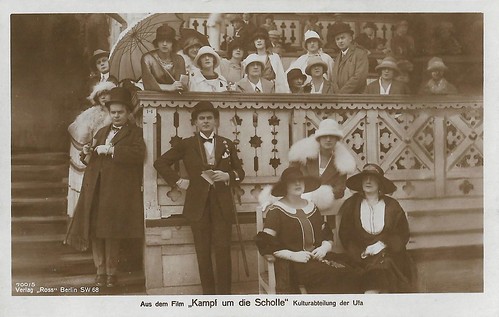
German postcard by Ross Verlag, no. 700/5, 1925-1926. Photo: Kulturabteilung der UFA. Publicity still for Kampf um die Scholle/Struggle for the Soil (Erich Waschneck, 1925). In the middle, Ferdinand von Alten as Axel von Wulffshagen, at the races, squandering his father's money.

German postcard by Ross Verlag, no. 59/1. Photo: Henny Porten Film. Henny Porten and Ferdinand von Alten in Die Flammen lügen (Carl Froehlich, 1926).
From the mid-1920s, Ferdinand von Alten had remarkable parts in Kampf um die Scholle (Erich Waschneck, 1925) with Oscar Marion, Der Student von Prag (Henrik Galeen, 1926) with Conrad Veidt, and Der Mann ohne Kopf (Nunzio Malasomma, 1927) with Carlo Aldini.
He co-starred again with Henny Porten in two more films, Kammermusik (Carl Froelich, 1925) and Die Flammen lügen (Carl Froehlich, 1926).
He also worked with Alfred Hitchcock in Champagne (Alfred Hitchcock, 1928) with Betty Balfour.
Other interesting films were Weib in Flammen (Max Reichmann, 1928) with Olga Tschechova, the early sound film Im Kampf mit der Unterwelt (Carlo Aldini, 1930) with Carlo Aldini, Gräfin Mariza (Richard Oswald, 1932) with Dorothea Wieck, and Die - oder keine (Carl Froehlich, 1932) starring Gitta Alpar and Max Hansen.
In addition, he acted in many minor parts in films. Von Alten's last part was a minor one in Das Meer ruft (Hans Hinrich, 1933), a fishermen's drama with Heinrich George, based on 'Terje Vigen' by Henrik Ibsen. Ferdinand von Alten had acted in a little over 100 films.
In 1933, Ferdinand von Alten died at the age of 47 from pleurisy and pneumonia, which he contracted during a theatre tour, and was buried at the St. Matthias Friedhof in Berlin.
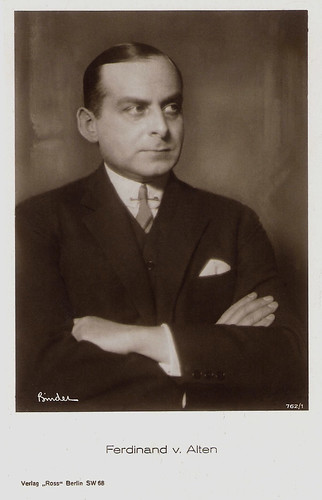
German postcard by Ross Verlag, no. 762/1, 1925-1926. Photo: Alex Binder.

German postcard by Ross Verlag, no. 762/2, 1925-1926. Photo: Alex Binder.
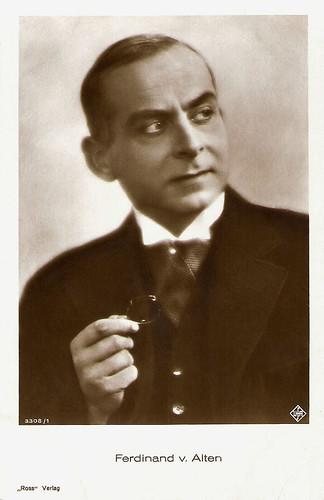
German postcard by Ross Verlag, no. 3308/1, 1928-1929. Photo: Ufa.
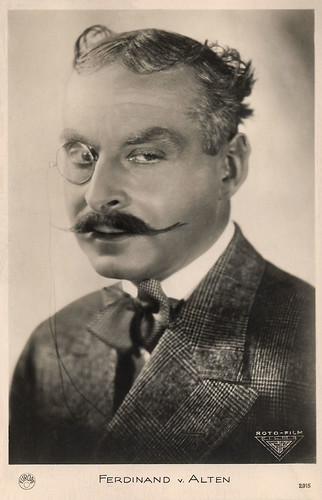
French postcard by Europe, no. 2915. Photo: Roto Film. Ferdinand von Alten in Gräfin Mariza/Countess Mariza (Richard Oswald, 1932).
Sources: Wikipedia (German), and IMDb.

German postcard by Ross Verlag, Berlin, no. 659/4. Photo: Rembrandt / Peter Paul Felner-Film Co. Ferdinand von Alten as the Prince of Aragon in Der Kaufmann von Venedig/The Merchant of Venice (Peter Paul Felner, 1923).

German postcard by Ross Verlag, no. 700/8. Photo: Ufa. Publicity still for Kampf um die Scholle/Struggle for the Soil (Erich Waschneck, 1925) with Ferdinand von Alten and Margarete Schön.

German postcard by Ross Verlag, no. 1063/7, 1927-1928. Photo: Atelier Perscheid, Berlin.
Elegant lovers, officers, and superiors
Ferdinand von Alten was born Theo von Alten, Baron von Lamezan auf Altenhofen in 1885 in St. Petersburg, then Russian Empire.
He began a military career like his ancestors had done, and became an officer. Yet, then he took acting lessons from reputed stage actor Albert Steinrück and decided to become an actor.
In 1911 he made his debut at the Hoftheater in Munich, where he worked until the end of the First World War. From 1918 he performed on the Berlin stages, particularly at the Deutsches Theater, where he was part of the ensemble during the 1920s.
He soon debuted in silent film and had his earliest known film part in the Henny Porten vehicle Die blaue Laterne (Rudolf Biebrach, 1918).
In the following years, he was often cast in medium and small roles, embodying elegant lovers, officers, and superiors.

German postcard. Editor unknown. Ferdinand von Alten, Hof-Schauspieler. This card dates from before 1919 when Von Alten worked as a stage actor at the Munich Hof-Theater (1911-1918).

German postcard by Rotophot in the Film-Sterne series, no. 567/2. Photo: Messter-Film, Berlin. Henny Porten and Ferdinand von Alten in Die blaue Laterne (Rudolf Biebrach, Messter 1918), based on the novel by Paul Lindau.

German postcard by Ross Verlag, no. 695/4. Photo: Maxim Film. Henny Porten, Ferdinand von Alten, and Friedrich Kayssler in Gräfin Donelli (G.W. Pabst, 1924). Von Alten played Baron von Trachwitz.
Lubitsch
From the late 1910s, Ferdinand von Alten alternated film companies. He acted at Berliner-Filmmanufaktur in films with Mady Christians, which were directed by Fred Sauer. Then followed Bayerische Film-Gesellschaft, Amboss-Film Dworsky, Cserépy-Film etc.
In 1920, Von Alten was Mark Smeaton in Ernst Lubitsch's period piece Anna Boleyn (1920), starring Henny Porten and Emil Jannings.
In the same year, he also played Napoleon Bonaparte opposite Fern Andra in Madame Récamier (1920).
He also starred as detective Joe Deebs in Gentlemen-Gauner (Willy Zeyn, 1920). Von Alten would also star in subsequent Joe Deebs films, such as Das Geheimnis der Mumie (1921), Ein Erpressertrick (1921), and Das Handicap der Liebe (1921).
Other remarkable parts he played in the early 1920s were in Danton (Dimitri Buchowetzki, 1921) starring Emil Jannings, Othello (Dimitri Buchowetzki, 1922) again starring Emil Jannings, Der Kaufmann von Venedig (1923) with Henny Porten, and Gräfin Donelli (G.W. Pabst, 1924) again with Porten.

German postcard by Ross Verlag, Berlin, no. 29/3. Photo: HPF (Henny Porten-Froelich-Produktion). Henny Porten, Ferdinand von Alten and Livio Pavanelli in Kammermusik/My Bachelor Husbands (Carl Froelich, 1925).

German postcard by Ross Verlag, no. 700/5, 1925-1926. Photo: Kulturabteilung der UFA. Publicity still for Kampf um die Scholle/Struggle for the Soil (Erich Waschneck, 1925). In the middle, Ferdinand von Alten as Axel von Wulffshagen, at the races, squandering his father's money.

German postcard by Ross Verlag, no. 59/1. Photo: Henny Porten Film. Henny Porten and Ferdinand von Alten in Die Flammen lügen (Carl Froehlich, 1926).
Hitchcock
From the mid-1920s, Ferdinand von Alten had remarkable parts in Kampf um die Scholle (Erich Waschneck, 1925) with Oscar Marion, Der Student von Prag (Henrik Galeen, 1926) with Conrad Veidt, and Der Mann ohne Kopf (Nunzio Malasomma, 1927) with Carlo Aldini.
He co-starred again with Henny Porten in two more films, Kammermusik (Carl Froelich, 1925) and Die Flammen lügen (Carl Froehlich, 1926).
He also worked with Alfred Hitchcock in Champagne (Alfred Hitchcock, 1928) with Betty Balfour.
Other interesting films were Weib in Flammen (Max Reichmann, 1928) with Olga Tschechova, the early sound film Im Kampf mit der Unterwelt (Carlo Aldini, 1930) with Carlo Aldini, Gräfin Mariza (Richard Oswald, 1932) with Dorothea Wieck, and Die - oder keine (Carl Froehlich, 1932) starring Gitta Alpar and Max Hansen.
In addition, he acted in many minor parts in films. Von Alten's last part was a minor one in Das Meer ruft (Hans Hinrich, 1933), a fishermen's drama with Heinrich George, based on 'Terje Vigen' by Henrik Ibsen. Ferdinand von Alten had acted in a little over 100 films.
In 1933, Ferdinand von Alten died at the age of 47 from pleurisy and pneumonia, which he contracted during a theatre tour, and was buried at the St. Matthias Friedhof in Berlin.

German postcard by Ross Verlag, no. 762/1, 1925-1926. Photo: Alex Binder.

German postcard by Ross Verlag, no. 762/2, 1925-1926. Photo: Alex Binder.

German postcard by Ross Verlag, no. 3308/1, 1928-1929. Photo: Ufa.

French postcard by Europe, no. 2915. Photo: Roto Film. Ferdinand von Alten in Gräfin Mariza/Countess Mariza (Richard Oswald, 1932).
Sources: Wikipedia (German), and IMDb.
No comments:
Post a Comment